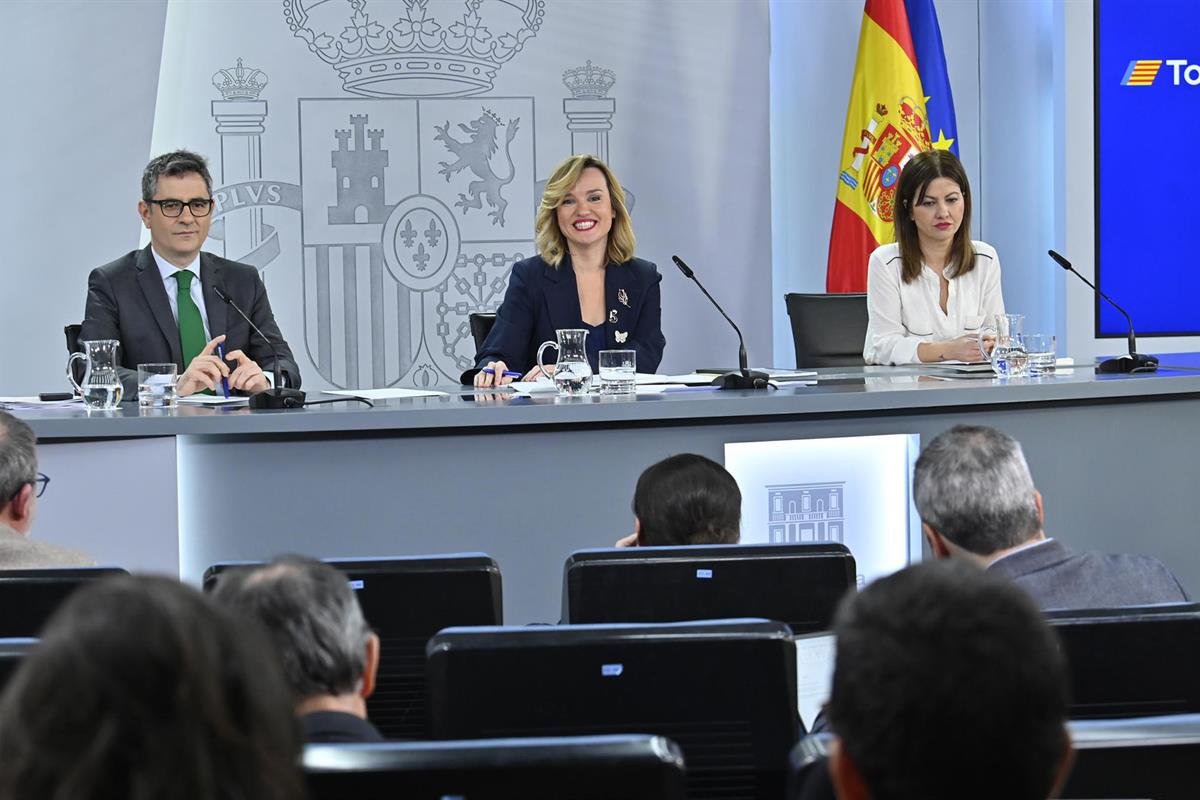Council of Ministers
The Government of Spain strengthens the protection of minors in digital environments
Council of Ministers - 2025.3.25
Moncloa Palace, Madrid
 Ministers Félix Bolaños, Pilar Alegría, and Sira Rego, during the press conference after the Council of Ministers (Pool Moncloa/José Manuel Álvarez)
Ministers Félix Bolaños, Pilar Alegría, and Sira Rego, during the press conference after the Council of Ministers (Pool Moncloa/José Manuel Álvarez)
The Council of Ministers has sent to the Spanish Parliament the draft organic law to protect minors in digital environments, a commitment made by the President of the Government of Spain, as the Minister for the Presidency, Justice and Parliamentary Relations, Félix Bolaños, recalled.
"Technological advances, social networks and access to the Internet are indispensable in today's society from a personal and professional point of view; however, they entail risks which, in the specific case of minors, are particularly dangerous," said Bolaños.
The minister pointed out that the average age for owning a mobile phone in Spain is 11 years old, that almost all minors with mobile phones have access to social media and that, in almost half of the cases, minors who access pornographic content do so casually while surfing the Internet or using social media. These are situations that concern more than 90% of citizens in Spain and in Europe as a whole, according to various surveys mentioned by Bolaños.
The head of the Ministry of the Presidency, Justice and Parliamentary Relations also stressed that the draft of the law presented in June last year incorporates contributions from numerous public and private organisations in Spain, as well as from the European Commission. The result, he argued, is a comprehensive, ambitious and pioneering regulation in Europe to try to solve the social problem of indiscriminate access by minors to social media and other digital environments.
Children's rights in the digital sphere
The Minister for the Presidency, Justice and Parliamentary Relations, Félix Bolaños, at the press conference after the Council of Ministers | Pool Moncloa / Jose Manuel Álvarez
The future law establishes that, in the digital sphere, minors have the right to be effectively protected, to truthful information and to equal and effective access to digital devices and connections. The law seeks to protect their right to privacy, honour and self-image and to encourage responsible use of technology by promoting digital skills.
The regulation includes the obligation for manufacturers of mobile devices to have effective, free and accessible parental control systems. It also comprehensively regulates access to and activation of so-called "random reward mechanisms" (also called 'loot boxes') present in some video games and platforms, a point that has been worked on together with the European Commission.
In the field of education, the text combines the promotion of digital skills with the obligation for schools to expressly regulate the use of mobile and digital devices, both in the classroom and in extracurricular activities, in accordance with the regional regulations that already exist or will have to be approved.
In relation to violence that occurs in the digital environment, the future law protects minors from gender-based and sexual violence in a very special way. Victims will have full access to information, counselling and psychological, social and even legal support services.
In the health field, the competent administrations are obliged to draw up health promotion guides and programmes, with emphasis on the prevention of addictive behaviours that can be caused by social media.
National Strategy for the Protection of Children and Adolescents
The Minister for Youth and Children, Sira Rego, during the press conference after the Council of Ministers | Pool Moncloa / Jose Manuel Álvarez
Public authorities should also develop a national strategy for the protection of children and adolescents in the digital sphere to accompany the new legislative framework.
Among the main axes of this strategy, the Minister for Youth and Children, Sira Rego, pointed to a media literacy plan which will ensure that children and adolescents know their rights in this area and how to exercise them. The Government will also launch, in collaboration with local councils and the Spanish Federation of Municipalities and Provinces, a school for mothers and fathers for digital environments. Public digital culture laboratories will also be promoted, conceived as spaces for creation, participation and development for children and young people. Another pillar of the strategy will be a research plan on the effects of technology on children.
Sira Rego highlighted the active participation of children and adolescents in the drafting of the regulation through the State Council for Child Participation. "They have made significant and sensible contributions on how to manage the digital environment, which affects them so much, through a law," she said.
The minister also referred to the "extremely important role of public services" in guaranteeing the rights and freedoms of minors in the digital environment, from training at all educational stages to prevention and early diagnosis of "problematic behaviour" through healthcare.
Amendments to the Criminal Code and other legislation
In addition, the draft law reforms a number of rules to strengthen the protection of minors in the digital environment.
Firstly, it amends the legislation to allow for judicial intervention when enforcing a measure of temporary interruption of a digital service that is offering inappropriate content to minors, or the removal of such content.
In addition, it introduces four new features in the Penal Code: it includes in the catalogue of penalties the prohibition for aggressors to communicate with victims in digital environments; it establishes as a crime making pornographic material indiscriminately available to minors; it classifies as crimes against moral integrity 'deepfakes' (created with the intention of appearing real in which the image or voice of a person is used) with sexual or seriously degrading content; and it considers the creation by adults of false profiles to appear to be minors and thus gain the trust of the victims as an aggravating circumstance in crimes against sexual freedom.
Finally, the General Law on Audiovisual Communication has been amended so that large media operators and influencers with a very large number of followers are obliged to have channels for reporting content that is inappropriate for minors. They must also report content that may be harmful to minors, use effective age verification systems and separate content of a pornographic or violent nature from other content.
Criminal liability for offences against the European Union
The Council of Ministers addressed the transposition of a European directive on the definition of criminal offences and sanctions for the violation of EU restrictive measures.
The Minister for the Presidency, Justice and Parliamentary Relations recalled that the European Commission does not have the capacity to guarantee compliance with the financial sanctions and embargoes it imposes on non-EU countries for contradicting European common foreign and security policy objectives. It is up to the member countries, explained Bolaños, to regulate how these sanctions are enforced, but at present national regulations are not harmonised. The aim of the directive is precisely to ensure that all EU countries implement this type of action on the same terms and with the same legal tools.
Among other new features, the draft transposition bill promoted by the Executive provides for criminal liability for non-compliance with EU restrictive measures by legal persons, which may be sanctioned according to their total turnover. It also amends the offence of money laundering to increase the penalty when the assets derive from committing an offence against the EU's area of freedom, security and justice.
National DTT Technical Plan
The Minister for Education, Vocational Training and Sports and Government Spokesperson, Pilar Alegría, during her speech at the press conference after the Council of Ministers | Pool Moncloa / Jose Manuel Álvarez
The Minister for Education, Vocational Training and Sports and Government Spokesperson, Pilar Alegría, announced that the Council of Ministers has approved a Royal Decree on the National Technical Plan for Digital Terrestrial Television (DTT), a document "debated and agreed with the sector since June 2024".
Alegría explained that, following the switch from analogue to digital, the new plan reflects the next step forward: the transition from high-definition to ultra high-definition broadcasts, a technology in which almost all European countries already broadcast and which, according to the government spokesperson, means offering "greater quality to the public".
€58.5 million in aid for text books
The Minister for Education highlighted the approval of a transfer of €58.5 million to the autonomous communities for grants to purchase textbooks and teaching materials. As Alegría argued, this is a "significant" transfer that represents a 20% increase in this aid since 2018, when this programme had funding of €48.5 million.
The aim of this allocation, which comes in addition to the €1.4 million earmarked for the programme in Ceuta and Melilla, is to help families purchase textbooks and teaching materials in all types of media, including digital, to compensate for disadvantaged socio-economic situations and to help the education system guarantee equity in education and equal rights and opportunities.
Specifically, the grants are aimed at pupils in Primary and Compulsory Secondary Education in publicly funded schools. The communities will be able to allocate part of the funds for grants to students in Bachillerato and Vocational Training.
Declaration of the Real Casa de Correos as a 'Place of Memory'
The Minister for the Presidency, Justice and Parliamentary Relations, Félix Bolaños, along with the Minister for Education, Vocational Training, and Sports, Pilar Alegría, and the Minister for Youth and Children, Sira Rego, address the press | Pool Moncloa / Jose Manuel Álvarez
Pilar Alegría reported that the Council of Ministers has agreed to challenge before the Constitutional Court the Community of Madrid's legislative amendment not to declare the Real Casa de Correos, the current seat of the Presidency of the Community of Madrid, as a Place of Democratic Memory.
The legislative amendment approved last December by the Community of Madrid includes new precepts that the Council of Ministers considers incompatible with the constitutional distribution of competences. The minister indicated that the decision had been taken after the Madrid government declined the invitation from the Ministry of Territorial Policy and Democratic Memory to discuss the matter and resolve any differences.
During Franco's dictatorship, the Real Casa de Correos housed the General Directorate of Security, a body that played a central role in political and social repression. Thus, this building became a symbol of repression because, in its cellars, thousands of detainees were interrogated and tortured for political and ideological reasons.
Other topical issues: President's appearance before the Lower House of Parliament
The government spokesperson recalled during her speech that the President of the Government of Spain will appear tomorrow in the Lower House of Parliament to report on the main lines of support for Ukraine and the debate on security and defence held at the European Council of 20 March.
Alegría also said that Pedro Sánchez will continue his series of meetings with European leaders to analyse the situation in Ukraine in Paris, where the head of the Executive will attend the meeting convened on Thursday 27 March by the French president, Emmanuel Macron.
Non official translation







